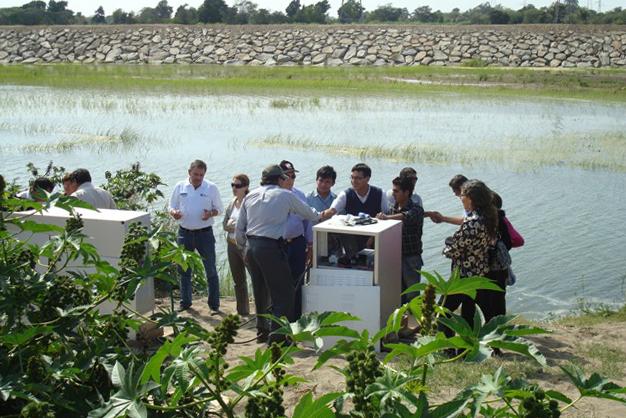Indian ‘scientrepreneurs’ pursue the Swiss dream

Indian science and tech wizards are exercising the option to ditch the lab and create startups in Switzerland. They share their experiences and provide tips on how to make it in the Alpine nation.
It literally took a tsunami to convince former IBM Switzerland executive Anil Sethi to take the plunge and create Flisom, a company that develops highly-efficient, flexible solar modules. The 2004 Indian Ocean tsunami that claimed around 230,000 lives highlighted the potential of the technology to generate enough electricity to provide clean drinking water to the survivors.
“That was the driver for me that a technology like this cannot continue to remain in a lab,” he says. “We have to give it our best shot to commercialise it.”
Sethi founded the company in 2005 and raised almost CHF100 million in funding.
But starting a company remains a challenge for many Indians with a science or technology background.
“The mindset of Indians, which really comes from the parents, is that you have to get a good job and a good salary,” says Sethi.
Ditching a well-paying job to set up a company with an uncertain future is something most Indian families are hesitant to encourage.
“Family are always worried for you,” says Sraboni Ghose who was one of the founders of a biotech company called Genionics. “They don’t want you to be in an uncertain situation financially and professionally.”
Until fairly recently, entrepreneurship was viewed in India as the preserve of the wealthy and well connected.
“Entrepreneurship is difficult in India because it has been controlled by very wealthy families and one can never imagine starting a company and getting investment,” says Sethi.
Chidambaram Narayanan, founder of software simulation company Ascomp, agrees that family background plays an important role.
“In India there are specific communities that know how to analyse the market and take risks,” he told swissinfo.ch. “Most of the Indians coming to Switzerland to do PhDs are probably not from these communities and are not business-minded.”
Swiss support
“In Switzerland, the advantage is you have this efficiency that allows you to focus on what you really want to do,” says Narayanan referring to the relative lack of bureaucracy when compared to India.
The alpine nation is also a strategic location for specific reasons.
“Switzerland offers stronger data protection and is very centrally located,” says Pramod Prasanth who created Cloudfeet – an online platform that allows small retailers in developing countries to keep track of inventory based on customer buying habits. “Some of the best coders for application development are here.”
Switzerland’s universities and local governments also offer valuable support in the form of innovation prizes, subsidised office space and networking opportunities.
“The university spin-off programmes really opens doors and gives credibility to a young company,” says Sethi. “It is quite a conservative market in Switzerland and young company approaching a large strategic player in the industry for partnership would struggle.”
Regional government initiatives can also be handy, especially for those like Prasanth who are not a part of the Swiss university system.
For example, i-net – the innovation network of Northwestern Switzerland – paid for the consulting firm PricewaterhouseCoopers to review Prasanth’s business plan.
Teething troubles
But Switzerland also throws up big challenges for Indian entrepreneurs. The high cost of living in Switzerland is definitely one of them.
“It takes an average of three years before you can get enough money to cover basic personal expenses,” says Sethi. “For me a really valuable asset during my journey was my wife who was working and supporting us financially.”
Many founders are forced to take up second jobs to make ends meet.
“Somebody I knew in the Indian community advised me to do translation work,” says Ghose. “I moonlighted as an interpreter for immigrants from India, Pakistan and Bangladesh on behalf of the canton of Zurich.”
The financial stress can even have repercussions on relationships. After almost 10 years working for Syngenta, Prasanth quit his job to start his company. A decision that did not go down well with his wife.
“My wife and I separated after I quit my job with Syngenta,” he told swissinfo.ch. “The cost of living in Switzerland is very high and we didn’t having enough savings which put a lot of stress on the relationship.”
Another big challenge is Switzerland’s immigration laws. Many Indian startup founders declare themselves as employees of their company in order to qualify for a temporary residence permit (B permit). The need to renew the permit every year adds to the stress and uncertainty of running a fledgling company.
It also doesn’t help that the years spent studying in a Swiss university do not count towards obtaining permanent resident status (C permit) – something that non-EU foreign residents are eligible for after ten years of uninterrupted stay in Switzerland.
“If Switzerland wants to encourage highly-educated and motivated young people to create companies they should at least count the years doing a PhD or postdoc towards a C permit,” says Narayanan.
However, sometimes being an outsider can be an advantage.
“Swiss companies are born global with most of their customers located outside Switzerland,” says Sethi. “My world view helps identify challenges in making the technology into products that will be as relevant in Africa as in Switzerland.”
And even if the business fails, many Swiss employers view an outsider’s attempt to start a company as something positive. Ghose, whose biotech startup folded after four years, is actively looking for a new position and feels her startup experience helps her stand out in job interviews.
“When potential employers see on my CV that I had founded a company it always becomes a topic of conversation at interviews because not many people do it,” she says.
Seven tips from Indian scientrepreneurs:
1. Coming up with a new technology is not enough, as there are often equivalent solutions already available. Ensure that it addresses the current needs of the industry.
2. Take advantage of the support offered by university spin-off programmes if you are part of the Swiss university system. If not, look for regional government initiatives designed to encourage entrepreneurship.
3. Make sure you have enough savings, a supportive spouse, consulting opportunities or a job to support you financially. It is unlikely that you can afford to pay yourself a living wage in the first few years.
4. Keep your costs as low as possible. The high cost of living in Switzerland means that you will burn through your funds much faster than anticipated.
5. Be prepared to handle tasks outside the lab like networking, fundraising and dealing with paperwork.
6. Learn the language. Even a basic knowledge of a Swiss language goes a long way in building valuable connections.
7. Ensure the startup experience helps you develop valuable skills and experience that are useful elsewhere in case the company doesn’t work out.

In compliance with the JTI standards
More: SWI swissinfo.ch certified by the Journalism Trust Initiative




You can find an overview of ongoing debates with our journalists here. Please join us!
If you want to start a conversation about a topic raised in this article or want to report factual errors, email us at english@swissinfo.ch.